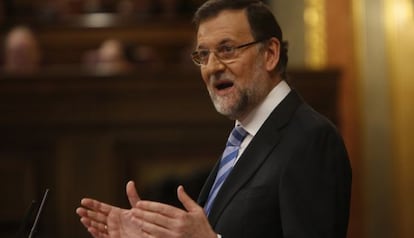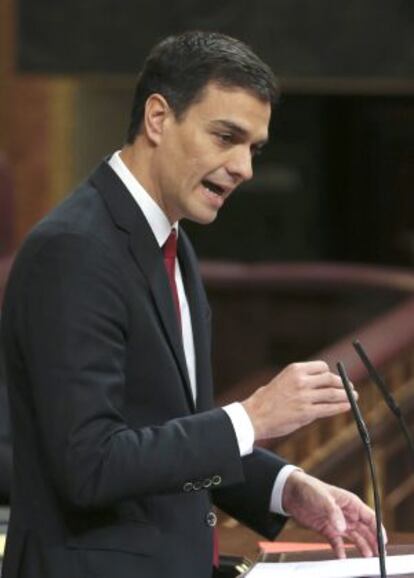Rajoy: “There is no such thing as generalized corruption in Spain”
PM delivers widely anticipated speech to Congress just hours after minister’s resignation

Prime Minister Mariano Rajoy addressed Congress on Thursday to talk about corruption and uphold the honesty of the majority of Spain’s politicians.
“There is no such thing as generalized corruption,” said Rajoy, of the conservative Popular Party (PP). “ I cannot accept seeing the suspicion of corruption applied to all politicians. I can understand citizens’ irritation and mistrust, but neither feeling justifies casting a general shadow of doubt.”
The widely anticipated speech took on added meaning because it came just hours after Health Minister Ana Mato was forced to resign over her alleged involvement in the Gürtel bribes-for-contracts scandal.
While Mato reportedly had no plans to step down, mounting internal pressure forced Rajoy to let go of one of his key officials at a delicate time for the party in power.
A series of scandals involving officials from the ruling party, the latest of which is the Púnica case, forced Rajoy to personally apologize to all Spaniards a few weeks ago “in the name of the PP.”
But on Thursday, Rajoy simply promised to carry on with the same measures he announced over 20 months ago on the same podium.
Meanwhile, the main opposition Socialists (PSOE) have been struggling with corruption cases of their own, most notably the ERE scandal in Andalusia involving fraudulent use of a regional fund for struggling businesses. Those under investigation include two former regional premiers and an ex-minister.
Speaking after Rajoy, Socialist secretary general Pedro Sánchez sought to portray his party as less tainted by corruption than the PP, and said the prime minister was in no position to lead a national anti-graft campaign.
“After knowing that your party profited from Gürtel you’re in no condition to regenerate Spain against corruption. You have neither the ability nor the legitimacy to lead this,” said Sánchez, a relative newcomer to politics who was elected Socialist leader last summer on the promise of deep internal change.

“I do not sit in a building built with undeclared funds, my former treasurer is not in prison, and I never received an envelope allegedly containing undeclared cash,” he told Rajoy, in reference to several scandals that are affecting the PP, and accusations that the PM himself was the recipient of slush fund money. “The common enemy is corruption, even if it doesn’t affect us equally.”
Rosa Díez, leader of the centrist Union, Progress and Democracy (UPyD) party, accused Rajoy of failing to take real action against corruption.
“Nobody understands why we haven’t done anything to date. You are incapable of solving corruption within your own party and you want to resolve corruption on the entire planet,” she said.
Cayo Lara, spokesman for United Left, attacked both the PP and the PSOE for their alleged connivance. “How is the agreement between you and the PSOE on deputies’ trips in any way related to [democratic] regeneration?” he asked Rajoy, in reference to recent revelations that deputies and senators get to travel using taxpayers’ money without having to provide any justification for the trips.
The mainstream parties have admitted that growing citizen anger at corruption is behind the meteoric rise of Podemos, a new leftist group that promises to sweep the political “caste” off the map and give Spain a fresh start with clean leaders who are not beholden to economic interests.
With general elections coming up next year, tackling corruption and their own deteriorating images has become paramount to both the PP and the PSOE.
Tu suscripción se está usando en otro dispositivo
¿Quieres añadir otro usuario a tu suscripción?
Si continúas leyendo en este dispositivo, no se podrá leer en el otro.
FlechaTu suscripción se está usando en otro dispositivo y solo puedes acceder a EL PAÍS desde un dispositivo a la vez.
Si quieres compartir tu cuenta, cambia tu suscripción a la modalidad Premium, así podrás añadir otro usuario. Cada uno accederá con su propia cuenta de email, lo que os permitirá personalizar vuestra experiencia en EL PAÍS.
¿Tienes una suscripción de empresa? Accede aquí para contratar más cuentas.
En el caso de no saber quién está usando tu cuenta, te recomendamos cambiar tu contraseña aquí.
Si decides continuar compartiendo tu cuenta, este mensaje se mostrará en tu dispositivo y en el de la otra persona que está usando tu cuenta de forma indefinida, afectando a tu experiencia de lectura. Puedes consultar aquí los términos y condiciones de la suscripción digital.








































